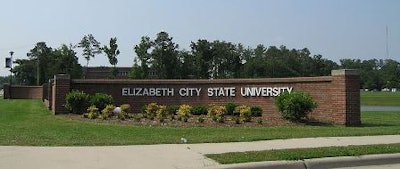 Elizabeth City State University is one of six universities that saw revenue from enrollment and state funding drop last year.
Elizabeth City State University is one of six universities that saw revenue from enrollment and state funding drop last year.CHAPEL HILL N.C.—Supervisors of North Carolina’s state university system are discussing whether to counter falling enrollment at six campuses that historically served primarily Black and American Indian students by allowing them to recruit more students from outside the state.
The University of North Carolina’s Board of Governors on Thursday heard a staff recommendation to allow up to 30 percent of newly enrolled students at the six schools to come from outside the state. Enrollment of non-North Carolina freshmen is now limited to 18 percent at the public universities. A year ago, 14 percent of the nearly 32,000 new freshmen were from out-of-state.
The discussion came two days after UNC System President Tom Ross warned faculty and staff at Elizabeth City State University of “hard decisions” ahead as the school faces a $5 million budget shortfall this year. Enrollment fell to under 2,900, costing the school about $1.5 million, UNC budget figures showed. ECSU’s enrollment this fall slid to just over 2,400 students, interim Chancellor Charles Becton said.
ECSU, Fayetteville State University, North Carolina A&T State University, North Carolina Central University, Winston-Salem State University, and UNC-Pembroke all saw revenues from enrollment and related state funding drop by more than $1 million last year, university officials said. All but NCCU projected further drops this year. All were established to train black students except UNC-Pembroke, which was created to serve nearby American Indian residents.
A decision is months away on the proposed five-year experiment to raise non-resident enrollment. The proposal includes keeping constant the number of North Carolina students as the campuses try to rebuild enrollment with more out-of-staters. Besides filling empty classroom seats and stabilizing campus budgets, the campuses would become more efficient as measured by spending per degree earned, said Jonathan Pruitt, a UNC system vice president for finance.
Another advantage is that almost half the out-of-state students who attend the six campuses stay in North Carolina after graduation, boosting the economy, Ross said.
“There is an economic benefit to North Carolina by attracting talent that stays here,” he said.
The extra revenue generated by attracting more non-resident students and charging them higher out-of-state rates wouldn’t generate loads of extra money for individual campuses, Ross said. The revenue goes to the state’s treasury, with some of the money coming back to the university to match teaching costs, he said.
Undergraduate tuition at Elizabeth City State this year is $2,776, while non-residents pay $13,633. At UNC-Pembroke, where only 3 percent of new undergraduates are from outside North Carolina, resident undergraduates pay $3,211 for tuition, while non-residents pay $12,418.
Previous discussions of expanding out-of-state enrollment have been criticized by both the public and political leaders, and the board’s discussion Thursday showed any decision can’t squeeze out opportunities for resident students to enroll.
“We’ve got a lot of people that’s moved into this state. We’ve got a lot of capacity that’s here with kids that want to go to school,” Frank Grainger of Cary said. “We’ve got to fill up our universities with North Carolina students as much as we can.”


















